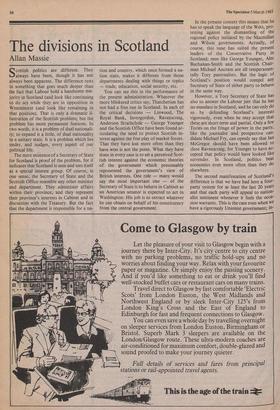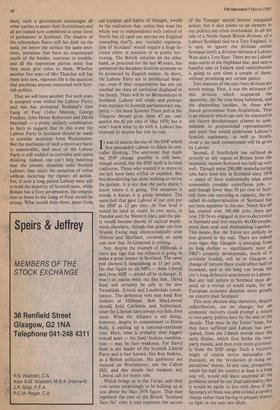The divisions in Scotland
Allan Massie
Q cottish politics are different. They L./always have been, though it has not always been apparent. The difference rests in something that goes much deeper than the fact that Labour hold a handsome ma- jority in Scotland (and look like continuing to do so) while they are in opposition in Westminster (and look like remaining in that position). That is only a dramatic il- lustration of the Scottish problem; but the problem has more permanent features. In two words, it is a problem of dual nationali- ty; to expand it a little, of dual nationality in a unitary state. It is a problem which lies under, and nudges, every aspect of our political life.
The mere existence of a Secretary of State for Scotland is proof of the problem, for it indicates that Scotland is seen and sees itself as a special interest group. Of course, in one sense, the Secretary of State and the Scottish Office resemble any other minister and department. They administer affairs within their province, and they represent their province's interests in Cabinet and in discussion with the Treasury. But the fact that the department is responsible for a na-
tion and country, which once formed a na- tion state, makes it different from those departments dealing with things or topics — trade, education, social security, etc.
You can see this in the performance of the present administration. Whatever the more blinkered critics say, Thatcherism has not had a free run in Scotland. In each of the critical decisions — Linwood, The Royal Bank, Invergordon, Ravenscraig, Anderson Strathclyde — George Younger and the Scottish Office have been found ar- ticulating the need to protect Scottish in- terest against the free play of market forces. That they have lost more often than they have won is not the point. What they have done in every case is to set a perceived Scot- tish interest against the economic theories of the government which presumably represented the government's view of British interests. One role — many would say the most important one — of the Secretary of State is to behave in Cabinet as an American senator is expected to act in Washington. His job is to extract whatever he can obtain on behalf of his constituency from the central government.
In the present context this means that he has to speak the language of the Wets, pro- testing against the dismantling of the regional policy initiated by the Macmillan and Wilson governments. Actually, of course, this tone has suited the present leaders of the Conservative Party in Scotland; men like George Younger, Alec Buchanan-Smith and the Scottish Chair- man Michael Ancram are all temperamen- tally Tory paternalists. But the logic of Scotland's position would compel any Secretary of State of either party to behave in the same way.
However, a Tory Secretary of State has also to answer the Labour jeer that he has no mandate in Scotland, and he can only do so by defending Scotland's interests vigorously, even when he may accept that these are short-term and partial. Only a few Tories on the fringe of power in the party, like the journalist and prospective can- didate Michael Fry, can openly say that Ian McGregor should have been allowed to close Ravenscraig; for Younger to have ac- cepted that policy would have looked like surrender. In Scotland, politics beat economics even more often than they do elsewhere.
The second manifestation of Scotland's difference is that we have had here a four
party system for at least the last 20 years and that each party will appeal to nation- alist sentiment whenever it feels the occa- sion warrants. This is the case even when we have a rigorously Unionist government; in
deed, such a government encourages all other parties to assert their Scottishness and all are indeed now committed to some form of parliament in Scotland. The shadow of the referendum fiasco still lies dark on the land; yet below the surface the same emo- tions, emotions that have no counterpart south of the border, continue to trouble; and all the opposition parties sense that they must give voice to them. Whether another five years of Mrs Thatcher will fan them into new, vigorous life is the question that perplexes anyone concerned with Scot- tish politics.
That we will have another five such years is accepted even within the Labour Party; and this has prompted Scotland's own Gang of Four (John Maxton, George Foulkes, John Home Robertson and David Marshall — a pretty unlikely combination in fact) to suggest that in this event the Labour Party in Scotland should be ready to consider secession from Westminster. But the mechanics of such a move are hard- ly conceivable, and most of the Labour Party is still wedded to centralist and statist thinking. Indeed, one can't help believing that the present situation suits Scottish Labour; they enjoy the sensation of virtue without incurring the rigours of action. Yet, if over a long period Labour were still to hold the majority of Scottish seats, while Britain has a Tory government, the tempta- tion to listen to the Gang of Four would be strong. What would deter them, apart from
old loyalties and habits of thought, would be the realisation that, unless they went the whole way to independence with control of North Sea oil (and can anyone see England conceding that?), any 'socialist regenera- tion of Scotland' would require a huge in- crease either in taxation or in public bor- rowing. The British solution on the other hand, as practised for the last 40 years, has permitted the decadent Scottish economy to be protected by English money. In short, the Labour Party are in intellectual disar- ray, even if their organisation has not yet reached the state of confusion displayed in the South. There will be no Bermondseys in Scotland. Labour will retain and perhaps even increase its Scottish parliamentary ma- jority — the latest Systems Three poll in the Glasgow Herald gives them 47 per cent against the 42 per cent of May 1979; but it won't know what to do with it. Labour has retained its empire but lost its role.
It was of course the rise of the SNP which first persuaded Labour to dilute its cen- tralist thinking. The sentiment that made the SN'P change possible is still here, though muted; but the SNP itself is in total confusion. Those who wanted it to move to the left have been stifled or expelled. But this bloodletting has done nothing to revive the patient. It is not that the party doesn't know where it is going. The situation is worse; it knows it is going nowhere. The same poll that gave Labour 47 per cent put the SNP at 12 per cent. At that level it would be hard to retain its two seats, in Dundee and the Western Isles, and the par- ty would become merely of tactical impor- tance elsewhere, though that great survivor Winnie Ewing may idiosyncratically seize Orkney and Shetland, certainly an open seat now that Jo Grimond is retiring.
Nor, despite the triumph of Hillhead, is there any sign that the Alliance is going to make a great impact in Scotland. The same poll showed it languishing at 11 per cent. On that figure its six MPs — three Liberal and three SDP — would all be in danger. It won't of course work out like that. David Steel will certainly be safe in the new Tweeddale, Ettrick and Lauderdale consti- tuency. The deference vote may keep Roy Jenkins at Hillhead. Bob MacLennan should hold Caithness and Sutherland, since the Liberals have always run him close there. What the Alliance is not doing, however, despite its commitment to Home Rule, is putting up a national-sentiment vote. Here, what is probably their biggest overall asset — the Steel/Jenkins combina- tion — may be their weakness. For David Steel is not leader of the Scottish Liberal Party and is best known, like Roy Jenkins, as a British politician. His ambitions are focused on Westminster, not the Calton Hill, and this simple fact weakens any Liberal call for home rule.
Which brings us to the Tories, and their vote seems surprisingly to be holding up at just about the May 1979 figure. That may represent the core of the British 'Scotland Says No' vote; it may represent the success
of the Younger special interest rearguard action; but it also points to an element in our politics too often overlooked. In all the talk of a North/South British division, of a Labour Scotland tied to a Tory England, it is easy to ignore the division within Scotland itself; a division between a Labour West and a Tory East. There are no Labour seats north of the Highland line, and only a handful east of Falkirk (and redistribution is going to cost them a couple of these, without promising any certain gains).
Two features of the east/west division are worth noting. First, it was the existence of this division which scuppered the Assembly, the No vote being bolstered, and the abstentions swollen, by those who feared government from Strathclyde. That is an obstacle which can only be removed in any future devolutionary scheme by com- mitment to proportional representation; and since that would undermine Labour's Scottish supremacy, as well as Strath- clyde's, no such commitment will be given by Labour.
Second, if Strathclyde has suffered as severely as any region of Britain from the recession, eastern Scotland has held up very well. Though some 200,000 manufacturing jobs have been lost in Scotland since 1974 — many of them undoubtedly what stern economists consider superfluous jobs — and though fewer than 30 per cent of Scot- tish firms are operating at capacity, the so- called de-industrialisation of Scotland has not been apparent in the east. North Sea oil has created over 100,000 jobs; there are now 230 firms engaged in micro-electronics in Scotland and they employ 40,000 people, more than steel and shipbuilding together. This means that the Tories are unlikely to lose ground in the east. There are indeed even signs that Glasgow is emerging from its long decline — significantly most of 1983's property development, much of it privately funded, will be in Glasgow; a change of fortune there could affect half of Scotland, and in the long run break the city's long defensive attachment to Labour. But any real upturn in Scotland must de- pend on a revival of world trade, for no European economy depends more greatly on exports than Scotland. This next election may therefore, despite redistribution, see no change; but an economic recovery could prompt a return to two-party politics here by.the end of the decade. That must be the Tories' hope, for they have suffered and Labour has pro- spered, from the Liberal revival since the early Sixties, which first broke the two- party mould, and then even more grievous- ly from the SNP surge. Such a recovery might of course revive nationalist en- thusiasm, on the 'revolution of rising ex- pectations' theory. In any case, prosperity, which for half the country at least is a long way off, would still leave unsettled all the problems raised by our dual nationality; but it would be easier to live with these if the Secretary of State was able to lead a cavalry charge rather than having to prepare always to fight in the next last ditch.















































 Previous page
Previous page